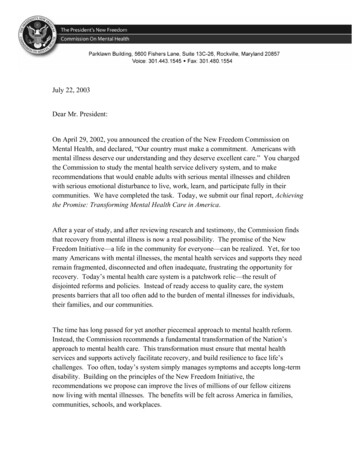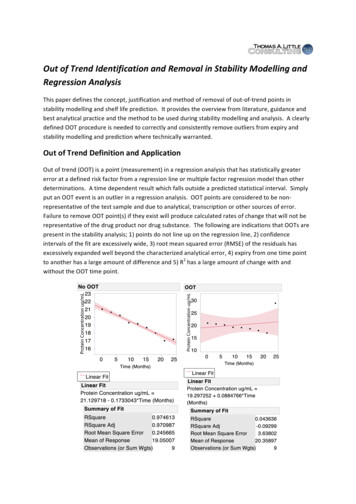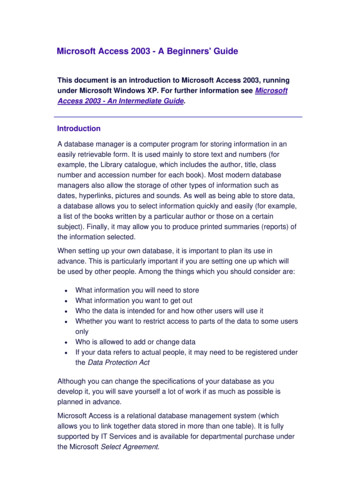
Transcription
July 22, 2003Dear Mr. President:On April 29, 2002, you announced the creation of the New Freedom Commission onMental Health, and declared, “Our country must make a commitment. Americans withmental illness deserve our understanding and they deserve excellent care.” You chargedthe Commission to study the mental health service delivery system, and to makerecommendations that would enable adults with serious mental illnesses and childrenwith serious emotional disturbance to live, work, learn, and participate fully in theircommunities. We have completed the task. Today, we submit our final report, Achievingthe Promise: Transforming Mental Health Care in America.After a year of study, and after reviewing research and testimony, the Commission findsthat recovery from mental illness is now a real possibility. The promise of the NewFreedom Initiative—a life in the community for everyone—can be realized. Yet, for toomany Americans with mental illnesses, the mental health services and supports they needremain fragmented, disconnected and often inadequate, frustrating the opportunity forrecovery. Today’s mental health care system is a patchwork relic—the result ofdisjointed reforms and policies. Instead of ready access to quality care, the systempresents barriers that all too often add to the burden of mental illnesses for individuals,their families, and our communities.The time has long passed for yet another piecemeal approach to mental health reform.Instead, the Commission recommends a fundamental transformation of the Nation’sapproach to mental health care. This transformation must ensure that mental healthservices and supports actively facilitate recovery, and build resilience to face life’schallenges. Too often, today’s system simply manages symptoms and accepts long-termdisability. Building on the principles of the New Freedom Initiative, therecommendations we propose can improve the lives of millions of our fellow citizensnow living with mental illnesses. The benefits will be felt across America in families,communities, schools, and workplaces.
The members of the Commission are gratified by your invitation to serve, are inspired bythe innovative programs across America that we learned about, and are impressed by thereadiness for change that we find in the mental health community. We look forward tothe work ahead to make recovery from mental illness the expected outcome from atransformed system of care.Sincerely,Michael F. Hogan, Ph.D.Chairman, President’s New Freedom Commission on Mental HealthThe Commission members:Jane Adams, Ph.D.Rodolfo Arrendondo, Jr., Ed.D.Patricia CarlileCharles G. Curie, M.A., A.C.S.W.Daniel B. Fisher, M.D., Ph.D.Anil G. Godbole, M.D.Henry T. Harbin, M.D.Larke N. Huang, Ph.D.Thomas R. Insel, M.D.Norwood W. Knight-Richardson, M.D., M.B.A.The Honorable Ginger Lerner-Wren2Stephen W. Mayberg, Ph.D.Frances M. Murphy, M.D., M.P.H.Robert H. Pasternak, Ph.D.Robert N. Postlethwait, M.B.A.Waltraud E. Prechter, B.A.Ed.Dennis G. SmithChris Spear, B.A., M.P.A.Nancy C. Speck, Ph.D.The Honorable Randolph J. Townsend, M.Ed.Deanna F. Yates, Ph.D.
The President’s New Freedom Commission on MentalHealthRoster of CommissionersMichael F. Hogan, Ph.D.ChairDirector, Ohio Department of Mental Health30 East Broad Street, 8th FloorColumbus, Ohio 43215-3430Jane Adams, Ph.D.Executive DirectorKeys for Networking, Inc.1301 South Topeka BoulevardTopeka, Kansas 66612Rodolfo Arredondo, Jr., Ed.D.Professor of NeuropsychiatryDepartment of NeuropsychiatrySouthwest Institute for Addictive DiseasesTexas Tech University Health Sciences Center3601 Fourth StreetLubbock, Texas 79430Patricia CarlileDeputy Assistant Secretary, Special NeedsProgramsU.S. Department of Housing and UrbanDevelopmentRobert C. Weaver Federal Building451 Seventh Street, S.W.Washington, DC 20410Charles G. Curie, M.A., A.C.S.W.AdministratorSubstance Abuse and Mental HealthServices Administration5600 Fishers Lane, Room 12-105Rockville, Maryland 20857Daniel B. Fisher, M.D., Ph.D.Co-DirectorNational Empowerment Center599 Canal StreetLawrence, Massachusetts 01840Anil G. Godbole, M.D.ChairmanAdvocate Illinois Masonic Medical CenterAdvocate Health Care836 West Wellington, Suite 7318Chicago, Illinois 60657Henry T. Harbin, M.D.Chairman of the BoardMagellan Health Services6950 Columbia Gateway DriveColumbia, Maryland 21046Larke N. Huang, Ph.D.Director of ResearchCenter for Child Health and Mental HealthPolicyGeorgetown University3307 M Street, N.W., Suite 401Washington, DC 20007Thomas R. Insel, M.D.DirectorNational Institutes of Mental HealthNational Institutes of Health6001 Executive Boulevard, Room 8235Bethesda, Maryland 20892-9669Norwood W. Knight-Richardson, M.D., M.B.A.CEO, Richardson GroupAssociate ProfessorOregon Health and Sciences University11565 N.W. McDaniel Rd.Portland Oregon 97229The Honorable Ginger Lerner-WrenSeventeenth Judicial CircuitBroward County, FloridaBroward County Courthouse201 Southeast 6th StreetFort Lauderdale, Florida 33301
Dennis G. SmithDirectorCenter for Medicaid and State OperationsCenter for Medicare and Medicaid Services200 Independence Avenue, S.W.Room 301HWashington, D.C. 20201Stephen W. Mayberg, Ph.D.DirectorCalifornia Department of Mental Health1600 Ninth Street, Room 151Sacramento, California 95814Frances M. Murphy, M.D., M.P.H.Deputy Under Secretary for Health PolicyCoordinationDepartment of Veterans Affairs810 Vermont Avenue, N.W., Suite 10HWashington, DC 20420Chris Spear, B.A., M.P.A.Assistant Secretary of Labor for PolicyU.S. Department of Labor200 Constitution Avenue, N.W.Washington, DC 20210Robert H. Pasternack, Ph.D.Assistant Secretary for Special Educationand Rehabilitative ServicesU.S. Department of Education330 C Street, S.W.Washington, DC 20202Nancy C. Speck, Ph.D.Telehealth ConsultantUniversity of Texas Medical Branch,Galveston3316 Huntington CircleNacogdoches, Texas 75965Robert N. Postlethwait, M.B.A.Consultant7274 Hunt Club LaneZionsville, Indiana 46077The Honorable Randolph J. Townsend, M.Ed.Nevada Senate695 Sierra Rose DriveReno, Nevada 89511Waltraud E. Prechter, B.A. Ed.ChairmanHeinz C. Prechter Fund for Manic DepressionOne Heritage Place, Suite 400Southgate, Michigan 48195Deanna F. Yates, Ph.D.Psychologist14815 San Pedro AvenueSan Antonio, Texas 78232Executive StaffClaire Heffernan, J.D.Executive DirectorNew Freedom Commission on Mental Health5600 Fishers Lane, Room 13C-26Rockville, Maryland 20857H. Stanley Eichenauer, M.S.W., A.C.S.W.Deputy Executive DirectorNew Freedom Commission on Mental Health5600 Fishers Lane, Room 13C-26Rockville, Maryland 20857
ContentsExecutive Summary .1Summary of Goals and Recommendations .17Goal 1:Goal 2:Americans Understand that Mental Health Is Essential to OverallHealth .19Understanding the Goal .Many People with Mental Illnesses Go Untreated.Stigma Impedes People from Getting the Care They Need .Suicide Presents Serious Challenges.Better Coordination Needed Between Mental Health Care and Primary Health Care.Mental Health Financing Poses Challenges .Services and Funding Are Fragmented Across Several Programs .Financing Sources Can Be Restrictive .1919202021212222Achieving the Goal .Public Education Activities Can Help Encourage People to Seek Treatment.Swift Action Is Need to Prevent Suicide.Recognize the Connection Between Mental Health and Physical Health .Address Unique Needs of Mental Health Financing.2323242626Mental Health Care Is Consumer and Family Driven .27Understanding the Goal .The Complex Mental Health System Overwhelms Many Consumers.Program Efforts Overlap.Consumers and Families Do Not Control Their Own Care .Consumers Need Employment and Income Supports .A Shortage of Affordable Housing Exists.Limited Mental Health Services Are Available in Correctional Facilities.Fragmentation Is a Serious Problem at the State Level.Consumers and Families Need Community-based Care .Consumers Face Difficulty in Finding Quality Employment.The Use of Seclusion and Restraint Creates Risks.2727282829303233333434Achieving the Goal .Develop Individualized Plans of Care for Consumers and Families.Involve Consumers and Families in Planning, Evaluation, and Services .Realign Programs to Meet the Needs of Consumers and Families .Align Federal Financing for Health Care.DEMONSTRATION: “Money Follows the Individual” Rebalancing.DEMONSTRATION: Community-based Alternatives for Children in PsychiatricResidential Treatment Facilities .DEMONSTRATION: Respite Care Services for Caregivers .Make Supported Employment Services Widely Available .Make Housing with Supports Widely Available.35353737383939404042v
Goal 3Goal 4:Goal 5:viAddress Mental Health Problems in the Criminal Justice and Juvenile Justice SystemsCreate Comprehensive State Mental Health Plans to Coordinate Services.Protect and Enhance Consumer and Family Rights .End Unnecessary Institutionalization.Eliminate the Need to Trade Custody for Mental Health Care .End Employment Discrimination.Reduce the Use of Seclusion and Restraint.43444545464646Disparities in Mental Health Services Are Eliminated .49Understanding the Goal .Minority Populations Are Underserved in the Current Mental Health System.Minorities Face Barriers to Receiving Appropriate Mental Health Care .Cultural Issues Also Affect Service Providers .Rural America Needs Improved Access to Mental Health Services .4949505050Achieving the Goal .Culturally Competent Services Are Essential to Improve the Mental Health System .Rural Needs Must Be Met.525254Early Mental Health Screening, Assessment, and Referral to ServicesAre Common Practice .57Understanding the Goal .Early Assessment and Treatment are Critical Across the Life Span.If Untreated, Childhood Disorders Can Lead to a Downward Spiral.Schools Can Help Address Mental Health Problems .People With Co-occurring Disorders Are Inadequately Served.Mental Health Problems Are Not Adequately Addressed in Primary Care Settings.575757585859Achieving the Goal .Early Detection Can Reduce Mental Health Problems .Schools Should Have the Ability to Play a Larger Rolein Mental Health Care for Children .Treatment for Co-occurring Disorders Must Be Integrated .Expand Screening and Collaborative Care in Primary Care Settings .6060626465Excellent Mental Health Care Is Delivered and Research IsAccelerated .67Understanding the Goal .The Delay Is Too Long Before Research Reaches Practice.Too Few Benefit from Available Treatment .Reimbursement Policies Do Not Foster Converting Research to Practice.Serious Workforce Problems Exist .Four Areas Have Not Been Studied Enough.Disparities in Mental Health Research .Long-term Use of Medications .The Impact of Trauma .Acute Care .67676869707070717171
Achieving the Goal .Speed Research On Treatment and Recovery .Bridge the Gap Between Science and Service .Change Reimbursement Policies to More Fully Support Evidence-Based Practices.Address the Workforce Crisis in Mental Health Care.Study Disparities for Minorities in Mental Health.Study the Effects of Long-term Medication Use.Examine the Effects of Trauma.Address the Problems of Acute Care .717172747576777777Technology Is Used to Access Mental Health Care and Information79Understanding the Goal .Mental Health Care Lags in Using Technology.Access to Care Is a Concern in Rural and Other Underserved Areas .Information Technology Can Now Enhance Medical Records Systems.Consumers May Not Have Access to Reliable Health Information.7979808080Achieving the Goal .Underserved Populations Can Benefit from Health Technology .Electronic Medical Records Will Improve Coordination and Quality .Personal Health Information Systems Can Help Consumers Manage Their Own Care81818183Conclusion .86References.87Goal 6:Executive Order 13263, President's New Freedom Commission on Mental HealthAcknowledgmentsAcronymsList of Figures1.1. Causes of Disability – United States, Canada and Western Europe, 2000 .201.2. Suicide Is the Leading Cause of Violent Deaths Worldwide .211.3. Distribution of Public and Private Mental Health Expenditures, 1997.221.4. MODEL PROGRAM: Suicide Prevention and Changing Attitudes About Mental Health Care .252.1. MODEL PROGRAM: Integrated System of Care for Children with SeriousEmotional Disturbances and Their Families .362.2. MODEL PROGRAM: Supported Employment for People with Serious Mental Illnesses.412.3. MODEL PROGRAM: Integrated Services for Homeless Adults with Serious Mental Illnesses .453.1. MODEL PROGRAM: A Culturally Competent School-Based Mental Health Program.53vii
4.1. MODEL PROGRAM: Intervening Early to Prevent Mental Health Problems .614.2. MODEL PROGRAM: Screening Program for Youth .634.3. MODEL PROGRAM: Collaborative Care for Treating Late-life Depression inPrimary Care Settings .665.1. MODEL PROGRAM: Quality Medications Care for Serious Mental Illnesses .695.2. MODEL PROGRAM: Critical Time Intervention with Homeless Families .736.1. MODEL PROGRAM: Veterans Administration Health Information and CommunicationTechnology System .826.2. MODEL PROGRAM: Individualized Mental Health Resource Web Site .84viii
Executive SummaryWe envision a future when everyone with a mentalillness will recover, a future when mental illnesses canbe prevented or cured, a future when mental illnessesVISION STATEMENTare detected early, and a future when everyone with amental illness at any stage of life has access to effectivetreatment and supports — essentials for living, working,learning, and participating fully in the community.In February 2001, President George W. Bushannounced his New Freedom Initiative topromote increased access to educational andemployment opportunities for people withdisabilities. The Initiative also promotesincreased access to assistive and universallydesigned technologies and full access tocommunity life. Not since the Americans withDisabilities Act (ADA) — the landmarklegislation providing protections againstdiscrimination — and the Supreme Court’sOlmstead v. L.C. decision, which affirmed theright to live in community settings, has there beencause for such promise and opportunity for fullcommunity participation for all people withdisabilities, including those with psychiatricdisabilities.The President’s New Freedom Commission onMental Health (called the Commission in thisreport) is a key component of the New FreedomInitiative. The President launched the Commissionto address the problems in the current mentalhealth service delivery system that allowAmericans to fall through the system’s cracks.On April 29, 2002, the President identified threeobstacles preventing Americans with mentalillnesses from getting the excellent care theydeserve: Stigma that surrounds mental illnesses,The Commission’s findings confirm that there areunmet needs and that many barriers impede carefor people with mental illnesses. Mental illnessesare shockingly common; they affect almost everyAmerican family. It can happen to a child,a aIn his charge to the Commission, the Presidentdirected its members to study the problems andgaps in the mental health system and makeconcrete recommendations for immediateimprovements that the Federal government, Stategovernments, local agencies, as well as public andprivate health care providers, can implement.Executive Order 13263 detailed the instructions tothe Commission. (See the Appendix.) Unfair treatment limitations and financialrequirements placed on mental health benefitsin private health insurance, and The fragmented mental health service deliverysystem.aIn this Final Report, whenever child or children is used, it isunderstood that parents or guardians should be included inthe process of making choices and decisions for minorchildren. This allows the family to provide support andguidance when developing relationships with mental health
brother, a grandparent, or a co-worker. It canhappen to someone from any background —African American, Alaska Native, AsianAmerican, Hispanic American, Native American,Pacific Islander, or White American. It can occurat any stage of life, from childhood to old age. Nocommunity is unaffected by mental illnesses; noschool or workplace is untouched.In any given year, about 5% to 7% of adults have aserious mental illness, according to severalnationally representative studies.1-3 A similarpercentage of children — about 5% to 9% — havea serious emotional disturbance. These figuresmean that millions of adults and children aredisabled by mental illnesses every year.1; 4routine patient care is unnecessarily long, lastingabout 15 to 20 years.8In its report, the Institute of Medicine (IOM)described a strategy to improve the quality ofhealth care during the coming decade, includingpriority areas for refinement.9 These documents,along with other recent publications and researchfindings, provide insight into the importance ofmental heath, particularly as it relates to overallhealth.In this Final Report Adults with a serious mental illness are personsage 18 and over, who currently or at any timeduring the past year, have had a diagnosablemental, behavioral, or emotional disorder ofsufficient duration to meet diagnostic criteriaspecified within DSM-III-R (Diagnostic andStatistical Manual for Mental Disorders)10, thathas resulted in functional impairmentb whichsubstantially interferes with or limits one ormore major life activities.President Bush said,“ Americans must understand and sendthis message: mental disability is not ascandal — it is an illness. And like physicalillness, it is treatable, especially when thetreatment comes early.”A serious emotional disturbance is defined as amental, behavioral, or emotional disorder ofsufficient duration to meet diagnostic criteriaspecified in the DSM-III-R that results infunctional impairment that substantiallyinterferes with or limits one or more major lifeactivities in an individual up to 18 years of age.Examples of functional impairment thatadversely affect educational performanceinclude an inability to learn that cannot beexplained by intellectual, sensory, or healthfactors; an inability to build or maintainsatisfactory interpersonal relationships withpeers and teachers; inappropriate types ofbehavior or feelings under normal circumstances;a general pervasive mood of unhappiness ordepression; or a tendency to develop physicalsymptoms or fears associated with personal orschool problems.11Over the years, science has broadened ourknowledge about mental health and illnesses,showing the potential to improve the way in whichmental health care is provided. The U.S.Department of Health and Human Services (HHS)released Mental Health: A Report of the SurgeonGeneral,5 which reviewed scientific advances inour understanding of mental health and mentalillnesses. However, despite substantial investmentsthat have enormously increased the scientificknowledge base and have led to developing manyeffective treatments, many Americans are notbenefiting from these investments.6; 7Far too often, treatments and services that arebased on rigorous clinical research languish foryears rather than being used effectively at theearliest opportunity. For instance, according to theInstitute of Medicine report, Crossing the QualityChasm: A New Health System for the 21stCentury, the lag between discovering effectiveforms of treatment and incorporating them intoprofessionals, community resource representatives, teachers,and anyone else the individual or family invites. This samesupport and guidance can also include family members forindividuals older than 18 years of age.2bFunctional impairment is defined as difficulties thatsubstantially interfere with or limit role functioning in oneor more major life activities, including basic daily livingskills (e.g., eating, bathing, dressing); instrumental livingskills (e.g., maintaining a household, managing money,getting around the community, taking prescribedmedication); and functioning in social, family, andvocational/educational contexts (Section 1912 (c) of thePublic Health Services Act, as amended by Public Law102-321).
Mental Illnesses PresentsSerious Health ChallengesThe Current Mental HealthSystem Is ComplexMental illnesses rank first among illnesses thatcause disability in the United States, Canada, andWestern Europe.12 This serious public healthchallenge is under-recognized as a public healthburden. In addition, one of the most distressingand preventable consequences of undiagnosed,untreated, or under-treated mental illnesses issuicide. The World Health Organization (WHO)recently reported that suicide worldwide causesmore deaths every year than homicide or war .13In its Interim Report to the President, theCommission declared, “ the mental healthdelivery system is fragmented and in disarray lead[ing] to unnecessary and costly disability,homelessness, school failure and incarceration.”The report described the extent of unmet needsand barriers to care, including:In addition to the tragedy of lost lives, mentalillnesses come with a devastatingly high financialcost. In the U.S., the annual economic, indirectcost of mental illnesses is estimated to be 79billion. Most of that amount — approximately 63billion — reflects the loss of productivity as aresult of illnesses. But indirect costs also includealmost 12 billion in mortality costs (lostproductivity resulting from premature death) andalmost 4 billion in productivity losses forincarcerated individuals and for the time of thosewho provide family care.14In 1997, the latest year comparable data areavailable, the United States spent more than 1trillion on health care, including almost 71 billionon treating mental illnesses. Mental healthexpenditures are predominantly publicly funded at57%, compared to 46% of overall health careexpenditures. Between 1987 and 1997, mentalhealth spending did not keep pace with generalhealth care because of declines in private healthspending under managed care and cutbacks inhospital expenditures.15In 1997, the United States spent morethan 1 trillion on health care,including almost 71 billion ontreating mental illnesses. Fragmentation and gaps in care for children, Fragmentation and gaps in care for adults withserious mental illnesses, High unemployment and disability for peoplewith serious mental illnesses, Lack of care for older adults with mentalillnesses, and Lack of national priority for mental health andsuicide prevention.The Interim Report concluded that the system isnot oriented to the single most important goal ofthe people it serves — the hope of recovery. Stateof-the-art treatments, based on decades ofresearch, are not being transferred from research tocommunity settings. In many communities, accessto quality care is poor, resulting in wastedresources and lost opportunities for recovery.More individuals could recover from even themost serious mental illnesses if they had access intheir communities to treatment and supports thatare tailored to their needs.The Commission recognizes that thousands ofdedicated, caring, skilled providers staff andmanage the service delivery system. TheCommission does not attribute the shortcomingsand failings of the contemporary system to a lackof professionalism or compassion of mental healthcare workers. Rather, problems derive principallyfrom the manner in which the Nation’scommunity-based mental health system hasevolved over the past four to five decades. Inshort, the Nation must replace unnecessaryinstitutional care with efficient, effective3
community services that people can count on. Itneeds to integrate programs that are fragmentedacross levels of government and among manyagencies.Building on the research literature and commentsfrom more than 2,300 consumers,c familymembers, providers, administrators, researchers,government officials, and others who providedvaluable insight into the way mental health care isdelivered, after its yearlong study, the Commissionconcludes that traditional reform measures are notenough to meet the expectations of consumers andfamilies.To improve access to quality care and services, theCommission recommends fundamentallytransforming how mental health care is deliveredin America. The goals of this fundamental changeare clear and align with the direction that thePresident established.To improve access to quality care andservices, the Commissionrecommends fundamentallytransforming how mental health careis delivered in America.up-to-date knowledge to provide optimum care forthe best outcomes.When a serious mental illness or a seriousemotional disturbance is first diagnosed, the healthcare provider — in full partnership withconsumers and families — will develop anindividualized plan of care for managing theillness. This partnership of personalized caremeans basically choosing who, what, and howappropriate health care will be provided: Choosing which mental health careprofessionals are on the team, Sharing in decision making, and Having the option to agree or disagree withthe treatment plan.The highest quality of care and information will beavailable to consumers and famili
readiness for change that we find in the mental health community. We look forward to the work ahead to make recovery from mental illness the expected outcome from a transformed system of care. Sincerely, Michael F. Hogan, Ph.D. Chairman, President's New Freedom Commission on Mental Health The Commission members: Jane Adams, Ph.D.











